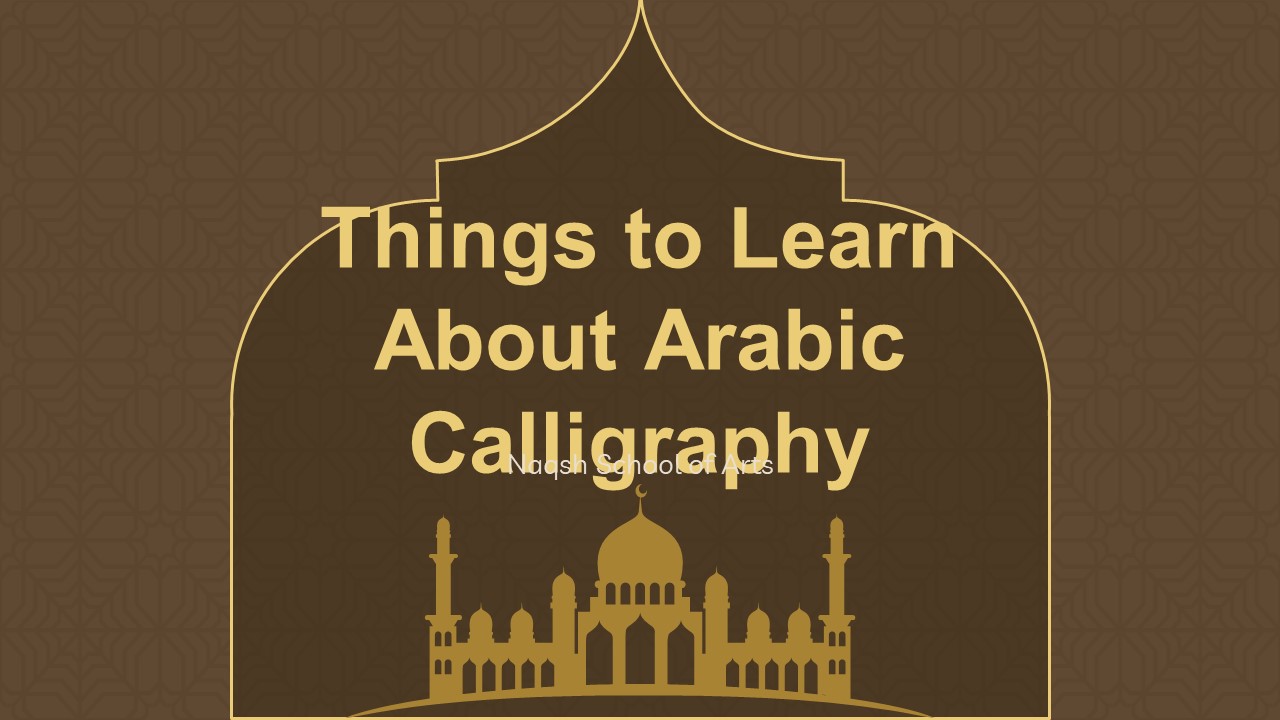Things To Learn About Arabic Calligraphy - PowerPoint PPT Presentation
Title:
Things To Learn About Arabic Calligraphy
Description:
Arabic calligraphy is a unique handwriting art technique based on Arabic letters. From ancient times, Arabic calligraphy has been widely known and appreciated throughout the world for its beauty, diversity, and developmental power. Its use is linked to advances in arts, crafts, architecture, and education in Arab civilization. Today, this art form is used in Pakistan for literature, art, literature, religious quotes and verses, and even greeting cards. – PowerPoint PPT presentation
Number of Views:32
Title: Things To Learn About Arabic Calligraphy
1
Things to Learn About Arabic Calligraphy
- Naqsh School of Arts
2
- Arabic calligraphy is a unique handwriting art
technique based on Arabic letters. From ancient
times, Arabic calligraphy has been widely known
and appreciated throughout the world for its
beauty, diversity, and developmental power. Its
use is linked to advances in arts, crafts,
architecture, and education in Arab civilization.
Today, this art form is used in Pakistan for
literature, art, literature, religious quotes and
verses, and even greeting cards.
3
ARABIC CALLIGRAPHY STYLES
- The popularity of Arabic calligraphy can be
attributed to highly respected professionals who
have contributed to the development of this type
of art. Over the years, calligrapher artists from
different parts of Pakistan, from major cities
like Karachi to smaller cities, have developed
many types of calligraphy.
4
- Worldwide, the emergence of Arabic
calligraphy has a long history, with some types
of calligraphic scripts created under empires
that do not exist even today. Diwani, for
example, was created for the rule of the Ottoman
Empire. It is still used today in non-religious
texts such as ornaments and greeting cards. - Kufic is the oldest style of Arabic calligraphy.
It was invented in Iraq during the 7th century to
produce the Quran. In the following centuries, it
was the only text used in the writing of the
Quran and is still widely used. Today, however,
it is also used for coins and inscriptions. - One of the first styles created was the Naskh. It
was used for writing books and books and is still
used today in the work of painting. The hardest
style to do well for calligrapher artist Thuluth,
but it is also among the best styles and one of
the easiest ways to learn.
5
USED TOOLS
- Unlike modern calligraphy which requires a nib,
nib holder, and ink, Arabic calligraphy tools
include several types of special pens, specially
designed for different types of calligraphic
texts. - A Qalam is the most common type of calligraphy
pen and is considered a symbol of wisdom in
Islam. It is made of cut reeds and dried. The pen
is also made of reeds, but these pens require a
long healing process to be used for writing in
Arabic calligraphy.
6
The bamboo pen is the oldest tool in the world of
calligraphy. It has a tight limit but also offers
a level of flexibility that allows calligraphers
to perform water movements. The Java pen is made
of Javanese grass and because of its durability,
it produces sharp edges of letterforms that make
it perfect for small scripts. The handam pen
comes in a variety of sizes, making it suitable
for a wide variety of different types of writing.
It is also very strong and unlike other types of
pens, it does not need to be sharpened regularly.
Lastly, cell pens are great for calligraphy. They
are made of bamboo and have ink boxes built into
them. Most Arabic calligraphy is done on ahar
paper. Made by hand in central India and topped
with starch, alum and egg whites. This adhesive
keeps the ink from entering the paper, so if a
calligrapher artist makes a mistake, he can erase
the ink and make adjustments without damaging the
paper.
7
READING THE CALLIGRAPHY OF ARABIC HOUSES
- An Arabic calligraphy is an art form that has
been passed down from generation to generation.
Learning to write in this way is very much
dependent on observation and imitation. - Students learn this calligraphy very well by
going to personal and teaching classes to look at
precise movements and patterns many times before
they learn how to imitate them. Students often
practice their calligraphy at home on practice
sheets and return them to their teacher for
review. It is not a fast course. - Learning this art form can take years to
complete. You can find calligraphy courses
at calligraphy courses in Lahore. - If you would like to learn more about this art
form, you can choose to focus on reading the
creative expression behind it. This approach to
learning does not focus on mastering the art form
but rather on learning the basics as a way to
capture the beauty of the text.
8
Thank You































